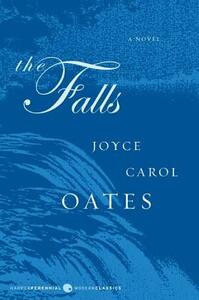Take a photo of a barcode or cover
It's hard to tell whether you want to strangle Ariah for being so absolutely clueless or, like Don Draper's first wife, is she just a product of her times.
Joyce Carol Oates is one of those insta-buy authors for me, and this was her first novel that I've read! It was a bit difficult for me to get into at first, since it's definitely character driven rather than plot driven, and it took me a while to warm up to all the characters. That said, I loved the longitudinal view it took of everyone's lives, and how differently all of them turned out, even though they were all connected by the same event. And once I was warmed up to the characters, I was hooked.
I'm often unhappy with the ending of character driven books, because by the time I've reached the end, I'm in love with all of the characters too much for there to be a truly satisfying ending. But Joyce Carol Oates is an amazing storyteller, and doesn't shy away from writing characters that are messy and flawed and imperfect, which ultimately made the ending a good one for me.
I'm often unhappy with the ending of character driven books, because by the time I've reached the end, I'm in love with all of the characters too much for there to be a truly satisfying ending. But Joyce Carol Oates is an amazing storyteller, and doesn't shy away from writing characters that are messy and flawed and imperfect, which ultimately made the ending a good one for me.
emotional
medium-paced
The Falls starts with a man jumping into Niagara Falls on his honeymoon to escape what he knows will be a loveless and inauthentic future with his new bride, Ariah. The chaotic, churning water remains a pointed backdrop for Ariah's melodramatic struggles. She quickly rebounds with a successful lawyer, Dirk Burnaby, who helps her keep a seven day vigil for her husband's corpse at the falls (and here I thought I'd had some lousy dates), then throws this second marriage away over the course of approximately eight million pages for reasons that were never fully clear to me but include shades of paranoia, low self-esteem, and tedious mewling. Ariah convinces herself Dirk is having an affair with his client in an environmental hazards case, but they never commit sexual indiscretion. In what I found to be the precise moment the book became irredeemable, the client goes on to seduce Dirk & Ariah's now-adult son 20 years later in a cemetery the day before the son's wedding, unless she was just a dream/ghost/symbol/ugh. As the preceding anecdote reveals, a huge span of time is covered in the novel, conceivably to flesh out musings about legacies and fate. There is also that heavy handed symbolism with the falls, and religion, and (I kid you not) an old-timey tightrope walker.
I'm awarding only two stars because the main characters were not engaging enough to me to invoke love or hate, or complex enough to escape obvious fates -- they just droned on with repetitive speech that put the "die" in dialogue. (If I encountered the phrase "Shame, shame, Burnaby is the name" one more time I personally was going to make a pilgrimage to the falls and jump into them.) In short, I'd never read Joyce Carol Oates before, but I'd heard she was a mind-blowing author. Well, my mind certainly is blown, but "wtf?"-style.
I'm awarding only two stars because the main characters were not engaging enough to me to invoke love or hate, or complex enough to escape obvious fates -- they just droned on with repetitive speech that put the "die" in dialogue. (If I encountered the phrase "Shame, shame, Burnaby is the name" one more time I personally was going to make a pilgrimage to the falls and jump into them.) In short, I'd never read Joyce Carol Oates before, but I'd heard she was a mind-blowing author. Well, my mind certainly is blown, but "wtf?"-style.
Avid Readers' Summary, by Bridget
The novel was generally well received by the group [even Dave enjoyed it!:] and considered to have many features of the The Great American Novel with themes of family, industrialisation, a complex male character tackling a contemporary issue, and the concept of redemption, both personal and religious.
The large number of characters created some difficulty, only two of whom, Royall and Stonecroft, were considered to have an inner narrative. Ariah, was low in self esteem and had experienced difficult circumstances, but she could have reacted differently to these and was not felt to be a likeable character. She seemed, and considered herself, doomed from the beginning. She treated her each individual child differently and kept secrets from them; only music gave any meaning to her life. She displayed no interest in her husband Dirk’s work life as a lawyer and the very complex environmental case he became involved in which ultimately led to his death.
The emphasis on suicides, real, suspected and attempted, was unsettling but fitted with the fables surrounding the perceived power of the Niagara Falls. Some elements of the narrative were difficult to believe: the suicide of Ariah’s first husband on the morning following his wedding and Royall’s meeting in the cemetery with ‘the woman in black’. There was some disagreement within the group regarding the structure of the novel. Some found the way in which it dealt with one character at the time to be disjointed, whereas others liked the way in which this seemed like a number of linked short stories with the time shifts maintaining the reader’s interest.
The use of language and writing was quite traditional but the plot was contemporary with its references to corruption and exploitation of the environment, which was the dark side of the fascination with the Falls. It was felt to be good on place being very true to the Falls region and good on time, i.e. the 1950’s, particularly in terms of the lack of awareness and lack of knowledge of sexuality and the repression of homosexuality. The description of music was also very good.
Despite some disappointments, overall this dark novel was considered quite satisfying particularly with the sense of hope and redemption at the end.
On the whole, I agree: guess which comments were mine.
The novel was generally well received by the group [even Dave enjoyed it!:] and considered to have many features of the The Great American Novel with themes of family, industrialisation, a complex male character tackling a contemporary issue, and the concept of redemption, both personal and religious.
The large number of characters created some difficulty, only two of whom, Royall and Stonecroft, were considered to have an inner narrative. Ariah, was low in self esteem and had experienced difficult circumstances, but she could have reacted differently to these and was not felt to be a likeable character. She seemed, and considered herself, doomed from the beginning. She treated her each individual child differently and kept secrets from them; only music gave any meaning to her life. She displayed no interest in her husband Dirk’s work life as a lawyer and the very complex environmental case he became involved in which ultimately led to his death.
The emphasis on suicides, real, suspected and attempted, was unsettling but fitted with the fables surrounding the perceived power of the Niagara Falls. Some elements of the narrative were difficult to believe: the suicide of Ariah’s first husband on the morning following his wedding and Royall’s meeting in the cemetery with ‘the woman in black’. There was some disagreement within the group regarding the structure of the novel. Some found the way in which it dealt with one character at the time to be disjointed, whereas others liked the way in which this seemed like a number of linked short stories with the time shifts maintaining the reader’s interest.
The use of language and writing was quite traditional but the plot was contemporary with its references to corruption and exploitation of the environment, which was the dark side of the fascination with the Falls. It was felt to be good on place being very true to the Falls region and good on time, i.e. the 1950’s, particularly in terms of the lack of awareness and lack of knowledge of sexuality and the repression of homosexuality. The description of music was also very good.
Despite some disappointments, overall this dark novel was considered quite satisfying particularly with the sense of hope and redemption at the end.
On the whole, I agree: guess which comments were mine.
Another magnificent book written by Joyce Carol Oates, even if it's quite depressing but very realistic.
3* Missing Mom
4* Carthage
4* Little Bird of Heaven
3* Marriages and Infidelities
4* Little Bird of Heaven
4* The Falls
TR Marya
TR Bellefleur
TR Jack of Spades
TR We Were the Mulvaneys
TB Blonde
TR The Accursed
TR Black Water
TR The Virgin in the Rose Bower
TR A Garden of Earthly Delights
TR The Lost Landscape: A Writer's Coming of Age
TR My Sister, my Love
TR The Man without a Shadow
3* Missing Mom
4* Carthage
4* Little Bird of Heaven
3* Marriages and Infidelities
4* Little Bird of Heaven
4* The Falls
TR Marya
TR Bellefleur
TR Jack of Spades
TR We Were the Mulvaneys
TB Blonde
TR The Accursed
TR Black Water
TR The Virgin in the Rose Bower
TR A Garden of Earthly Delights
TR The Lost Landscape: A Writer's Coming of Age
TR My Sister, my Love
TR The Man without a Shadow
Really a 3.5, but I decided it was enjoyable enough to round up.
Review from my blog BookRants:http://bookrants1.blogspot.com/
I have incredibly mixed feelings after finishing The Falls by Joyce Carol Oates. Awe, exasperation, dissatisfaction, appreciation, and exhaustion are all fighting to be forefront. I can't quite decide if if his was one of of he best novels I've read in a long time or the worst.
At its core, The Falls is an intimate glimpse into one family's life as its members experience love, pain, joy, loss, grief, connection, separation, trust, and betrayal.
Set in historic Niagara Falls, the story opens with a couple on their honeymoon and the groom's suicide. The reasons for the suicide are revealed to readers and we are compelled to keep reading in disbelief and in sympathy. As authorities search for her spouse's remains in the falls, the bride keeps vigil. By her side is confirmed bachelor Dirk Burnaby.
Over the span of the 28 years, readers join Ariah Erskine also known as "the Widow Bride of the Falls," as she deals with the loss of not one, but two husbands. Faced with these multiple tragedies, Ariah maintains a solid core of pride and strength as she pulls away from the world and creates her own safe space with her children and her piano at the center.
The dramatic irony of the novel's beginning instantly intrigued me. I felt strong sympathy for Gilbert, who could no longer maintain his charade. I felt pity for Ariah as well. Poor thing, having lost her husband of a day and becoming a media sensation.
When she meets Dirk, falls in love, and marries him, I breathed a sigh of relief. Finally, things are looking up Ariah. However, that small part of my reader brain that wasn't completely immersed in the story reminded me of the blurb and that "tragedy soon takes over their lives . . . " Oates does an amazing job of presenting their idyllic family life against the backdrop of scenic Niagara Falls. She does even better with increasing tension. Any hint of conflict was met with a panicked, "Is this it? The tragedy that 'poisons their hacyon years with distrust, greed, and murder'?"
Aside from the story, Oates writes stunning prose. Having never visited the Falls, I could still easily imagine its beauty and power. As much as I loved the prose, it felt overdone at times. Oates introduces some fascinating characters, but she doesn't allow them to breathe life into the story on their own. There is too much interjection by an omniscient 3rd person voice that I didn't appreciate. There were instances where I wanted to hear and feel directly from the characters themselves, and not from a narrator.
I thoroughly enjoyed the first 60-75% of the novel, but the last 25% dragged on and I struggled to finish. Eventually, I skimmed the last 50 pages just to see how it ends. Part of this could be due to the fact that I started The Falls a few weeks ago. It's been difficult to smuggle in reading time since I started substitute teaching full time. (Read about my Sub Adventures here.)
So I have to admit that by the time I picked The Falls back up, I was a bit fuzzy on details from the 300 pages. I believe that The Falls is the type of novel that cannot be completely appreciated on the first read. A second read is needed to absorb all of its subtle nuances. I'll get back to everyone when I've read a second time (if I ever get to it a second time).
Review from my blog BookRants:http://bookrants1.blogspot.com/
I have incredibly mixed feelings after finishing The Falls by Joyce Carol Oates. Awe, exasperation, dissatisfaction, appreciation, and exhaustion are all fighting to be forefront. I can't quite decide if if his was one of of he best novels I've read in a long time or the worst.
At its core, The Falls is an intimate glimpse into one family's life as its members experience love, pain, joy, loss, grief, connection, separation, trust, and betrayal.
Set in historic Niagara Falls, the story opens with a couple on their honeymoon and the groom's suicide. The reasons for the suicide are revealed to readers and we are compelled to keep reading in disbelief and in sympathy. As authorities search for her spouse's remains in the falls, the bride keeps vigil. By her side is confirmed bachelor Dirk Burnaby.
Over the span of the 28 years, readers join Ariah Erskine also known as "the Widow Bride of the Falls," as she deals with the loss of not one, but two husbands. Faced with these multiple tragedies, Ariah maintains a solid core of pride and strength as she pulls away from the world and creates her own safe space with her children and her piano at the center.
The dramatic irony of the novel's beginning instantly intrigued me. I felt strong sympathy for Gilbert, who could no longer maintain his charade. I felt pity for Ariah as well. Poor thing, having lost her husband of a day and becoming a media sensation.
When she meets Dirk, falls in love, and marries him, I breathed a sigh of relief. Finally, things are looking up Ariah. However, that small part of my reader brain that wasn't completely immersed in the story reminded me of the blurb and that "tragedy soon takes over their lives . . . " Oates does an amazing job of presenting their idyllic family life against the backdrop of scenic Niagara Falls. She does even better with increasing tension. Any hint of conflict was met with a panicked, "Is this it? The tragedy that 'poisons their hacyon years with distrust, greed, and murder'?"
Aside from the story, Oates writes stunning prose. Having never visited the Falls, I could still easily imagine its beauty and power. As much as I loved the prose, it felt overdone at times. Oates introduces some fascinating characters, but she doesn't allow them to breathe life into the story on their own. There is too much interjection by an omniscient 3rd person voice that I didn't appreciate. There were instances where I wanted to hear and feel directly from the characters themselves, and not from a narrator.
I thoroughly enjoyed the first 60-75% of the novel, but the last 25% dragged on and I struggled to finish. Eventually, I skimmed the last 50 pages just to see how it ends. Part of this could be due to the fact that I started The Falls a few weeks ago. It's been difficult to smuggle in reading time since I started substitute teaching full time. (Read about my Sub Adventures here.)
So I have to admit that by the time I picked The Falls back up, I was a bit fuzzy on details from the 300 pages. I believe that The Falls is the type of novel that cannot be completely appreciated on the first read. A second read is needed to absorb all of its subtle nuances. I'll get back to everyone when I've read a second time (if I ever get to it a second time).





